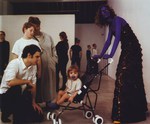This has been trapped on my iPad for months now. In the Times Literary Supplement in October, Oxford historian Peter Thonemann wrote an excellent review of two scholarly books on the Roman concept and experience of childhood
There is remarkably little good poetry about very small children. Maybe it's the lack of sleep that does it; for the first few months it's hard to remember to put out the bins, let alone write poems. Perhaps the first writer to make a serious attempt to evoke the world of earliest childhood was the Latin poet Statius, a contemporary of the Roman emperor Domitian (ad 81-96). In one of his most remarkable poems, Statius describes taking a newborn baby boy in his arms, "as he demanded the novel air with trembling wails". Bit by bit, he learned to interpret the child's inarticulate complaints and to soothe his "hidden wounds" (vulnera caeca). Later still, once the baby had learned to crawl, Statius would pick him up and kiss him, until bit by bit, cradled in the poet's arms, he would drop off to sleep. Statius's name was the toddler's first word, and Statius's face served as "his first plaything". How many other poets, in any language, have described the experience of having their face yanked around by a fascinated baby?Addressing the absence of a primary historical record, and contemporary historians' wariness of projecting meaning back onto the texts of the past, Thonemann wonders just how much of what we consider the instinctual essence of the parent-child relationship is really our current cultural construct.It comes, then, as a rude shock to discover that the baby was not Statius's son, but his slave.
Fortunately, his conclusion is not a total buzzkill.
Children in the Roman Empire [the-tls.co.uk]
Some discussion of Statius' Epicedion in puerum suum in the Silvae 5 [google books]



